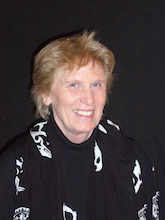Patricia Berry, Ph.D, is one of the founders of Archetypal Psychology along with James Hillman, to whom she was married for 20 years. She is a Zurich-trained Jungian Analyst and author of Echo’s Subtle Body: A Contribution to Archetypal Psychology. In 1991 she was the first Scholar in Residence at Pacifica Graduate Institute in California. She lectures internationally and has served as president of both the New England and the Inter-Regional Societies of Jungian Analysts.
Use the 15% discount code of “DRDAVE” for the 10 episode series featuring Jungian Analysts Patricia Berry and Robert Bosnak discussing Hillman and Alchemy. Click here for details!
Check out the following Psychology CE Courses based on listening to Shrink Rap Radio interviews:
Jungian Psychotherapy Part 1 (6 CEUs)
Jungian Psychotherapy Part 2 (7 CEUs)
Jungian Psychotherapy Part 3 (7 CEUs)
Jungian Psychotherapy Part 4 (6 CEUs)
Jungian Psychotherapy Part 5 (7 CEUs)
Jungian Psychotherapy Package of the Five Above (33 CEUs)
Wisdom of The Dream (4 CEUs)
Positive Psychology (6 CEUs)
Pros and Cons of Positive Psychology (5 CEUs)
CERTIFICATE PROGRAM IN POSITIVE PSYCHOLOGY (32 CEUs)
Body-Mind: Goodbye to Dualism (6 CEUs)
Brain: Insights from Neuroscience (8 CEUs)
Meditation & Psychotherapy (8 CEUs)
NEW! Crisis & Trauma: Identification, Assessment, & Treatment (15 CEUs)
Neuroscience and Healing (8 CEUs)
NEW! The Psychology of Relationships (7 CEUs)
Get our iPhone/Android app!
Get 10% discount on all lectures at The JungPlatform using our discount code: DRDAVE
You can also earn CEU’s by going to another partner website at Ed4Online!
A psychology podcast by David Van Nuys, Ph.D.
copyright 2014: David Van Nuys, Ph.D.
Podcast: Play in new window | Download
Subscribe: Apple Podcasts | RSS

In what sense were the terms ‘monotheism’ and ‘polytheism’ being used here (I’m guessing not in the straight religious sense), and how do they relate to Analytical and Archetypal Psychology? They’re not words I’ve ever heard used in a psychology sense.
Multiplicity is key to Hillman’s Arch. Psy. (see Re-Visioning Psychology).It has to do with viewing the world in terms of its multiplicity rather than in terms of a unifying idea (such as wholeness, for Jung) In religion this corresponds roughly to a polytheism as distinct from a monotheistic religion. it is the question of the one & the many. Arch. psy. prefers the many.
I was very interested to hear this interview as I never resonated much with Hillman and therefore wasn’t inclined to read too much of his. The Soul’s Code was way over my head but I suspect that I would have a different appreciation of it now, especially after hearing Patricia talk about him.
I tried to find the book referenced – Betrayal – but it is actually an article and is available here: http://www.blacksunjournal.com/psychology/18_betrayal-part-1-of-3-by-james-hillman_2001.html
The website itself is interesting as it is by the rebellious son of a couple who were heads of a cult.
It’s well worth a read and gave me a deeper appreciation of a couple of devastating betrayals I’ve experienced. I didn’t get some of the anima references but perhaps that’s because I’m not familiar enough with his work.
John, I haven’t heard the terms monotheism and polytheism used in psychology either but I assumed polytheism referred to an eclectic approach and monotheism a single disclipine approach founded on one particular person, such as Freud, Jung, Skinner etc. I know when I first came across Transactional Analysis I definitely related to it as a religion and thought of it as my saviour, as I was in a pretty desperate state at the time and had previously had a couple of unpleasant experiences with other therapists. In its defence the TA that I was exposed to encouraged open minded discussion and critiquing of it.
Thanks for this interview. As it happens, I just loaned a copy of Echo’s Subtle Body to a client. It remains my favorite Archetypal Psychology text.
thanks for this too bad the vital earlier phenomenological focus got left behind for the more Romantic notions of Anima-Mundi and all. As neuro-phenomenology is starting to bring to fruition much of Jung’s pioneering work on feeling-toned-complexes we desperately need that re-visioning attention to the lived-experience/active-imagination back in archetypal psychology.
Great interview.
I felt mildly demented as I wrestled with the ideas… mirroring your process… but found myself coming away with some important insights.
And I loved your anecdote about wrestling a student out of his easy going stupor as a young professor. LOL!! I would love to have been a fly on the wall for that episode! 🙂
Gloria,
Regarding polytheism/monotheism – Hillman wrote extensively on the Greek Gods as personification of archetypal perspectives and referred to his psychological approach as polytheistic to allow room in the psyche for multiplicity of voices and to revise the therapeutic focus from the Jungian emphasis on Wholeness to, as Patricia said, multiplicity.
I believe Hillman took his queue from Jung who stated that “the gods now live in our diseases.”
Hi.
Thank you for this interesting and great article.